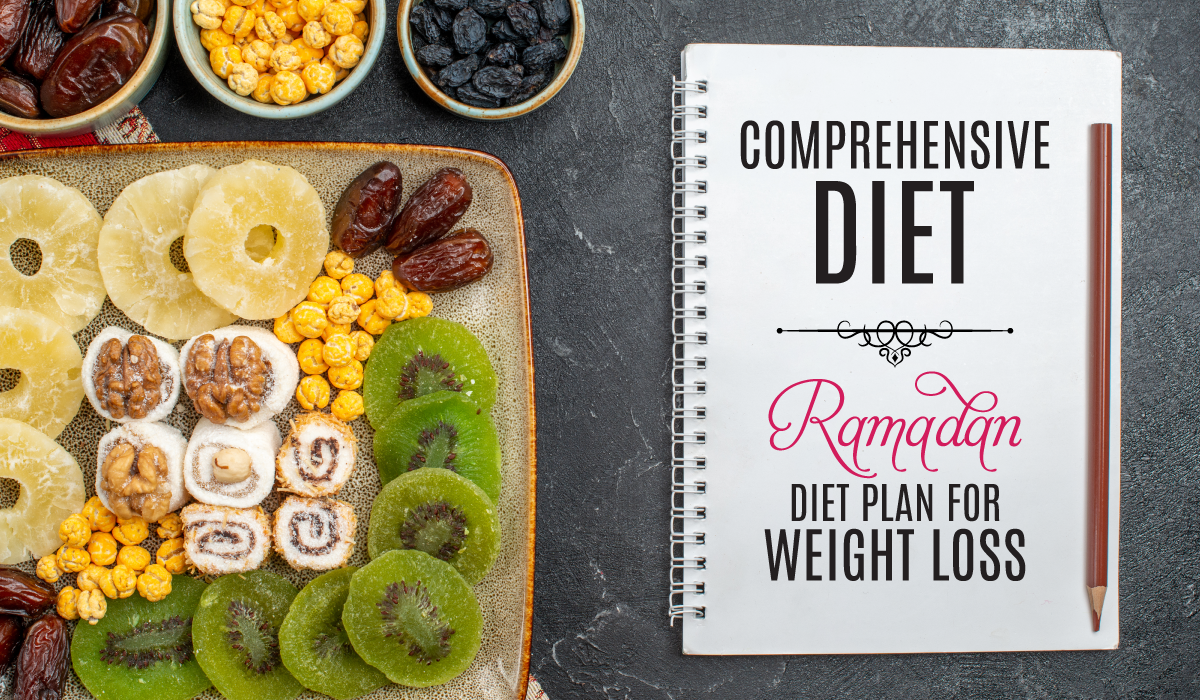
Nourishing the Body and Soul During Ramadan
The holy month of Ramadan is a time for reflection, spiritual growth, and fasting from sunrise to sunset. As you embark on this sacred journey, it's essential to prioritize your health and well-being. In this guide, we unveil a well-crafted Ramadan diet plan designed to support weight loss while ensuring you stay energized and nourished throughout the fasting period.
Understanding the Basics of Ramadan Fasting
It's important to understand the basics of fasting. Here are a few points to keep in mind
The Significance of Suhoor (Pre-dawn Meal)
Suhoor is your pre-dawn meal, providing the necessary energy to sustain you throughout the day. Opt for complex carbohydrates, lean proteins, and healthy fats to keep you full and energized.
Iftar (Breaking the Fast) – A Balanced Approach Breaking your fast with dates and water is a tradition, followed by a balanced meal. Incorporate a mix of carbohydrates, proteins, and vegetables to replenish energy stores and promote satiety.
Crafting Your Suhoor for Weight Loss Success
A power-packed suhoor is a good option for weight loss. Let's look at some of them
Whole Grain Delights: Opt for whole grain bread, oats, or brown rice for sustained energy release.
Protein-Rich Choices: Include lean proteins like eggs, yogurt, or cottage cheese to keep you feeling full.
Healthy Fats: Incorporate nuts, seeds, and avocados for essential fatty acids and prolonged satiety.
Navigating Iftar with Smart Food Choices Hydration is Key: Start with water, followed by a small portion of dates to replenish blood sugar levels. Balanced Plates: Include lean proteins (chicken, fish, legumes), complex carbs (quinoa, sweet potatoes), and a variety of colorful vegetables. Soups for Satiety: Opt for nutrient-rich soups, that aid digestion and prevent overeating.
Snacking Smartly Between Iftar and Suhoor
Here are some mindful Snacking tips
Hydrating Snacks: Include water-rich foods like cucumber, watermelon, and oranges for hydration.
Protein-Packed Snacks: Greek yogurt, boiled eggs, and chickpeas are excellent choices to curb hunger.
Portion Control: Be mindful of portion sizes during snacks to maintain a calorie-conscious approach.
Exercise and Activity During Ramadan
Timing Matters: Schedule workouts during non-fasting hours for optimal energy levels.
Moderate Exercise: Engage in moderate-intensity exercises like brisk walking, yoga, or swimming.
Post-Iftar Workouts: Light exercises post-Iftar can aid digestion and boost metabolism.
Hydration - The Cornerstone of Ramadan Wellness
Staying Hydrated During Non-fasting hours is very essential. Here are a few tips
Water Intake Strategies: Consume water gradually between Iftar and Suhoor to prevent dehydration.
Avoid Dehydrating Beverages: Limit caffeine and sugary drinks; opt for herbal teas and infused water.
Addressing Common Challenges
Coping with hunger and cravings is also essential for a better diet.
Mindful Eating Practices: Savor each bite and eat slowly to enhance satiety.
Nutrient-Rich Choices: Prioritize whole foods over processed snacks for sustained energy.
Seek Professional Guidance: Consult a nutritionist for personalized advice and a tailored Ramadan diet plan.
Balancing Spirituality and Wellness As you observe the holy month of Ramadan, remember that a well-balanced diet and mindful lifestyle choices can enhance both your spiritual experience and overall well-being. By embracing this comprehensive Ramadan diet plan, you not only support your weight loss goals but also nourish your body and soul during this sacred time.
Visit Esajee today for special Ramadan offers. May your Ramadan be filled with blessings, health, and a renewed sense of purpose.
FAQS
1. Can I still lose weight during Ramadan while fasting?
Yes, it's possible to lose weight during Ramadan by making healthy food choices, managing portion sizes, and being mindful of your eating habits during non-fasting hours.
2. How can I stay hydrated during fasting hours?
It's important to stay hydrated during Ramadan to avoid dehydration. Drink plenty of water during non-fasting hours, and consider consuming hydrating foods such as fruits and vegetables with high water content.
3. What should I eat for suhoor (pre-dawn meal) to stay full throughout the day?
Opt for complex carbohydrates, fiber-rich foods, and protein to keep you feeling full and energized during the fasting hours. Examples include whole grains, oatmeal, eggs, yogurt, and fruits. 4. How can I control overeating during iftar (breaking the fast meal)?
To avoid overeating during iftar, start with a small portion of food and eat slowly. Focus on balanced meals that include protein, healthy fats, complex carbohydrates, and vegetables. Avoid high-calorie and sugary foods, and listen to your body's hunger cues to prevent overindulging.






